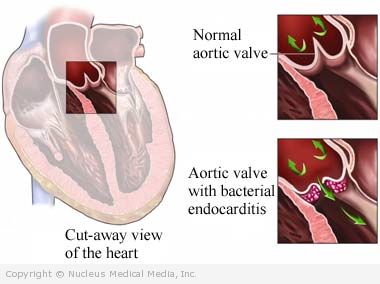Endocarditis – Definition
The endocardium is the inner lining of the heart muscle. Endocarditis is an infection of this lining and the heart valves.
Endocarditis – Causes
Causes include:
- Bacterial infection (most common cause)
- Viral or fungal infection
- Medical conditions that result in blood clotting too easily (causes a noninfectious form)
Endocarditis – Risk Factors
Factors that increase your chance of endocarditis include:
- Having an artificial heart valve
- History of endocarditis
- History of rheumatic fever, which can damage heart valves
- Heart defects
- Enlarged heart
- Mitral valve prolapse
- History of IV drug use
- Recent procedures that can lead to bacterial endocarditis, including:
- Tooth cleaning
- Tonsillectomy and adenoidectomy
- Bronchoscopy
- Surgery on the gastrointestinal, urinary, or respiratory tracts
- Gallbladder or prostate surgery
Endocarditis – Symptoms
Symptoms include:
- Fever, chills
- Weakness, low energy
- Sweatiness, especially at night
- Shortness of breath
- Cough
- Loss of appetite, weight loss
- Chest pain
- Abdominal pain
- Nausea and vomiting
- Painful red bumps on the fingers and toes
- Purple dots on the whites of the eyes, under the fingernails, and over the collarbone
- Painful red patches on the fingers, palms, and soles
Endocarditis – Diagnosis
The doctor will ask about your symptoms and medical history. A physical exam will be done. The doctor will check your heart for unusual heart sounds. These are called heart murmurs.
Tests include:
- Blood tests — to check for infection
- Echocardiogram — uses high-frequency sound waves (ultrasound) to examine the size, shape, and motion of the heart
Endocarditis – Treatment
Treatment may include:
- Antibiotics — given through your veins for up to 4-8 weeks
- Surgery — to repair or replace the valve if it is severely damaged or has caused heart failure
Endocarditis – Prevention
If you have a high risk of infection:
- You may need to take antibiotics before certain dental or medical procedures.
- Talk to your dentist or doctor before the procedure.
The American Heart Association guidelines recommend that preventive antibiotic therapy should be considered for individuals with the following cardiac conditions:
- Various forms of congenital heart disease (heart defects)
- Artificial heart valves
- History of endocarditis
- Heart transplant recipients who have developed valve disease
- Avoiding illegal IV drugs will also decrease your risk of infection.

